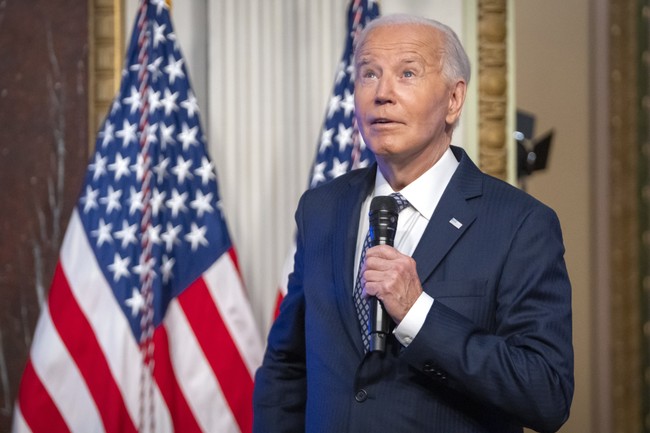It will go down as one of the most infamous taglines in modern campaign history: “Kamala is for they/them — President Trump is for you.” With a reported $200 million behind ads like that in 2024, the right successfully placed Democrats outside the mainstream. Yet since the election, the party has made no serious effort to reposition itself on transgender issues, the defining cultural battle of this moment. That denial must end if Democrats are to return to the mainstream — and to winning.
Can Democrats remain supportive of a small and vulnerable segment of the population without seeming out of touch with much of America? Is there a middle ground they can occupy on issues relating to transgender people and still find their way out of the political wilderness? I believe the answer to these questions is yes.
First, Democrats should express their frustration and disgust with the ways extremists on both sides have weaponized the issue. Doing so will immediately signal to swing voters that they are trying to resolve, not exploit, the culture wars. Democrats can make clear that on the right, hardcore conservatives have used this debate primarily to inflict harm, painting transgender people as monsters who seek to change our culture and history. On the far left, progressive activists police our language, attempting to shame those who step out of line or do not agree with every item on their agenda. While there is no moral equivalency between those two sides — the demonization by the right is much worse — both extremes are wrong and are adding far more heat than light to this evolving and complex national conversation. Democrats must forcefully reject polarization and point-scoring and instead champion a middle ground that allows for a more reasonable debate.
Second, for Democrats to regain the support of centrist voters who deliver electoral victories, they must meet Americans where they are today, not where advocates might wish them to be, or where society may be headed in the future. Culture is always upstream of politics, and views may shift in the coming decades. But the current political reality is stark: The GOP was able to raise serious doubts among swing voters using this issue because Democrats allowed themselves to be seen as out of sync with the values and views of the American majority.
Where exactly does the majority stand on transgender issues? Many Americans know someone who is trans or who has a transgender loved one and wants them to be treated with kindness. Even as the left and right offer simplistic slogans and moral certitude, the broader public understands the complexity. As recent Pew research shows, a majority wants some limitations on sports participation based on an athlete’s sex assigned at birth. And the same majority believes we must protect transgender people from discrimination in work, housing and healthcare.
Swing voters believe that Republicans can be cruel. But they also are exasperated with many Democrats. Polling from Blueprint identified this as a significant vulnerability for Democrats last year. The statement, “Kamala Harris is focused more on cultural issues like transgender issues rather than helping the middle class,” ranked third in their testing of the most compelling reasons not to vote for the vice president. (It trailed only inflation and immigration.) Democrats ignore or dismiss such flashing red warning signs at their electoral peril.
Third, Democrats must be clear about their convictions and positions — and those must align with that compassionate but concerned majority. As a baseline, most voters believe there are two biological sexes: male and female, and that a person’s gender matches the sex he or she was assigned at birth. At the same time, many also recognize that there are people who feel deep down that the sex they were assigned at birth is not who they are. Instead of arguing over X and Y chromosomes or getting into complicated scientific topics, Democratic politicians should keep it simple: Share your view that there are two sexes and that there are many ways people can identify by gender, a social construct not a biological one.
When it comes to kids under 18, Republicans are stoking fears that minors could access medical care for a gender transition without parental consent. That’s why Democrats must be firm: Without explicit parental consent, no one should ever receive gender-affirming care, whether that’s medication or any other medical intervention beyond mental health support. (This has the benefit of being both the medical standard of care and a legal requirement in every state; Republicans are trying to criminalize gender-affirming care even when parents support it.) As for sports, transgender girls and women should not be allowed to compete in women’s sports at the level of high school or above in ways that compromise safety or fairness. But these should not be decisions for politicians; instead, rules governing those activities should be made by sports associations and local school districts.
When it comes to adults, Democrats should take a different approach and be committed libertarians. Transgender adults should be accepted and included. They should be free to lead the lives they choose and have the same rights and opportunities, including to health care and employment, enjoyed by all Americans. This is not only morally right, it is politically sound. Defending fundamental liberties for adults is strongly backed by majorities in virtually all nonpartisan public opinion research.
To win the middle, Democrats need not shy away from criticizing the harsh rhetoric and policies of the right and insisting on treating transgender people with dignity and respect. Preventing transgender Americans from getting passports that reflect their gender identity, threatening to defund suicide hotlines, kicking them out of the military — all of this is gratuitous and mean, and voters agree. In fact polling shows solid support for non-discrimination protections of transgender people even as Trump has rolled out an anti-trans agenda. And once they move to the center, Democratic policymakers will have far better standing to vote against Republican proposals to ban health care, impose gender checks on girls’ sports at every age or attempt to erase the very existence of transgender people.
Lastly, Democrats must cancel the gender language police. If someone’s heart is in the right place, that’s what counts, not using what advocates may deem the politically correct words on a subject for which the language is in flux. Insisting on, and even using, new and controversial terms like “pregnant people” unnecessarily puts Democrats outside the mainstream. Similarly, no one should be pressured to introduce themselves with their pronouns — a practice many Americans find at best annoying and at worst deeply alienating.
This middle ground will not satisfy the advocacy groups on the left. Indeed, it may well upset them. That’s OK; it’s their job to push. But there’s nothing in such a principled and pragmatic approach that throws anyone under the proverbial bus. A centrist stance also won’t be a feature on Megyn Kelly’s podcast, since nuance doesn’t generate clicks, while outrage is a ratings bonanza.
I recognize the backlash I will likely face in proposing that Democrats seize the center on this issue. But many in the Democratic coalition share, if only among close and trusted friends, the sense that we are walking on eggshells. They fear they’ll be berated or ostracized by making public any viewpoints or using language that diverges from progressive groupthink or online orthodoxy.
That silence is proving a political disaster. It’s time for real discussion, dissent and debate, without fear of being canceled. Because if we feel that way, imagine how it strikes swing voters, who are tired of being lectured to and feeling judged. They will give the party a serious second look only if they see a heterodox and welcoming space in the Democratic coalition, including for Americans who are deeply uncomfortable with these issues for personal or religious reasons.
If you ask voters to name their top 20 policy priorities, few would put transgender issues on that list. But what Trump and Republicans understood was that a cultural issue like this one can be made into a defining characteristic. There may be no “winning” on transgender issues. But if Democrats hope to flip the House, expand the Senate map and take back the White House, it is imperative they pivot decisively to meet Americans where most of them are now: in the sensible center.
.png)















 English (US)
English (US)